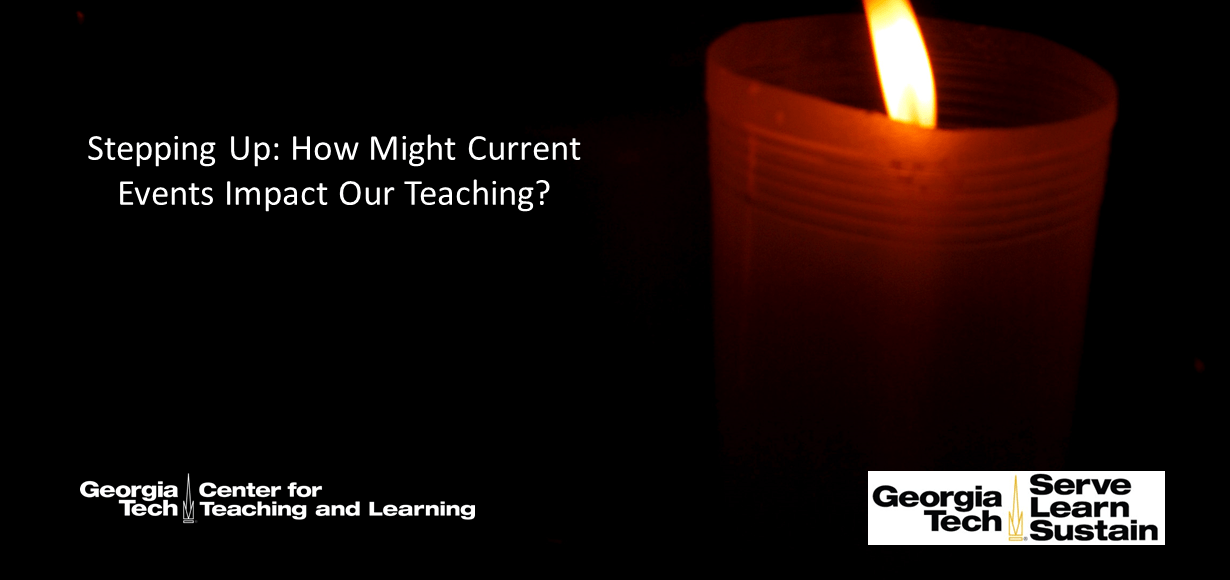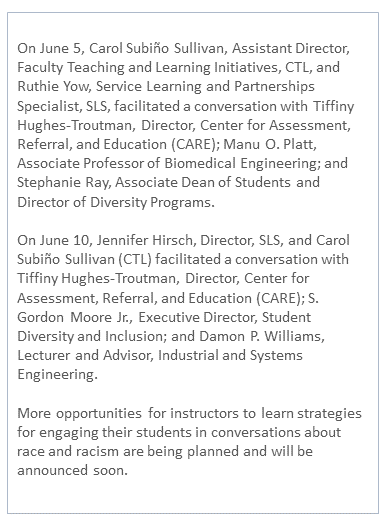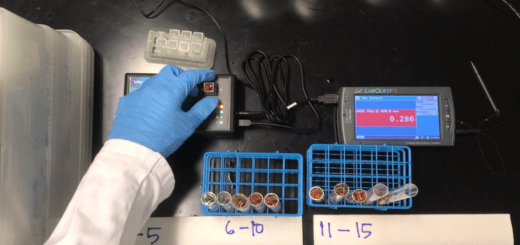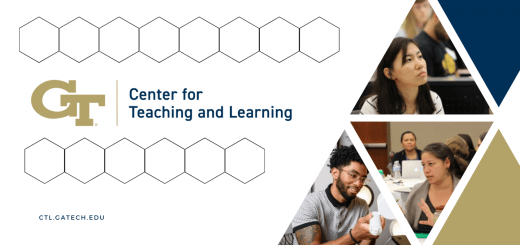Stepping Up to Support Students in the Current Moment

Jennifer Hirsch (SLS), Evan Mallen (CTL), Rebecca Pope-Ruark (CTL), and Ruthie Yow (SLS) contributed substantially to this post.
This summer’s news presents a reality that no one wants to encounter. The pandemic has not disappeared with the arrival of warm weather, and the Covid-19 death toll around the world continues to rise. Evidence of systemic racism and police brutality abounds in one city after another. Daily protests grow, and change may be underway — but not soon enough to prevent another deadly shooting in Atlanta last weekend.
Teaching in troubling times always presents challenges. On June 5 and 10, 2020, the Centers for Teaching and Learning (CTL) and Serve-Learn-Sustain (SLS) hosted two virtual conversations with Georgia Tech instructors to think through how and why to engage with students in the current moment. Should we treat the world around us as a distraction, or should we somehow integrate it into our teaching? What do we want our students to learn from our time together this summer?
More than 80 members of the Georgia Tech community participated in the virtual conversations. These sessions were not recorded so that instructors could have an honest discussion about this difficult subject. Below are highlights from these sessions and advice from our conversation leaders.
How might current events impact the teaching and learning experience? And how should faculty respond?
Whether or not instructors choose to bring up George Floyd and the protests over his killing, students are thinking about these events. These thoughts are impacting the way students are experiencing their classes. Dr. Platt advised faculty not to be afraid of starting the conversation with their students. He and Dean Ray both urged faculty to be explicit about addressing racism and not just use terms like “diversity.” Mr. Moore also urged faculty to realize that many of their students are suffering and not to ignore the situation. “Be still, listen, and acknowledge what they are going through,” he urged. Dean Ray urged faculty to say something, be prepared to actively listen to students, and thank them for sharing their stories. She offered the suggestion of establishing ground rules for engagement to lay the groundwork for a respectful conversation.
Students, especially students of color, are experiencing historical trauma in this moment. Dr. Hughes-Troutman explained that the long history of systemic racism and violence against the black community creates a layered effect that heightens the experience of current trauma. The conversation leaders also emphasized that instructors do not need to be experts in race, social justice, or trauma to hold space and care for students in this traumatic time. Doing so can simply mean acknowledging and listening to students, and providing them with a space in which to share their experiences.
Students are not necessarily waiting for faculty to be the ones to start the conversation. For example, Dean Ray shared that students contacting her office have asked for support in asking faculty to reschedule tests, as they find it difficult to concentrate on their studies in the midst of all they are experiencing in this moment. Georgia Tech has a number of policies that can inform instructors on how they might adjust instructional deadlines and expectations. For example, Georgia Tech’s Student-Faculty Expectations outline guidelines to create “an atmosphere of mutual respect, acknowledgement, and responsibility between faculty members and the student body.” Georgia Tech policy XII.D.4 allows faculty to reschedule a final exam for an individual student in case of hardship. “However, the Institute does have policies regarding times that exams/assignments should not be due/scheduled (e.g., final instructional days). As faculty make adjustments, it is important to be mindful of these constraints,” advised Dr. Kyla Ross, Assistant Vice Provost for Advocacy and Conflict Resolution.
Dr. Hughes-Troutman encouraged faculty to take student requests for learning accommodations due to the current crisis seriously because trauma and chronic stress have real, observable effects on the brain, which impact learning. Students may find it difficult to concentrate, solve problems, and even sleep. All of these effects will make it nearly impossible to study. These pieces from the Los Angeles Times and NPR provide some more information about how chronic stress from racism impacts health in the African American community.
The conversation leaders agreed that instructor well-being and self-care are also critical at this time. Dr. Platt encouraged instructors to be attentive to their own emotional and psychological well-being in this moment. He acknowledged that he too found himself needing to take some time to be still for himself before he was able to effectively support his students and manage his other responsibilities as a faculty member. This self-care is normal and necessary. Dr. Hughes-Troutman encouraged instructors to be role models in self-care for their students by sharing the ways that they are personally taking time to cope with the way the moment is impacting them. ”There is a great role for compassion among all of this ongoing stress, for your students, for each other, and for ourselves.,” she said, “Try to have understanding and grace for yourself, and you may have more compassion for your students.” She shared that research has shown a number of ways to effectively cope with trauma, and that each students’ coping strategies will vary. For example, for some, mindfulness practices or engaging in quiet introspection will help. For others, engaging in activism provides a way to cope. For more information about strategies for coping with traumatic events, Dr. Hughes-Troutman recommended these resources on ways that people of color can foster mental health, building resilience, and mental health for activists.
So how might faculty respond to their students who are hurting in this moment?
Dr. Hughes-Troutman encouraged faculty to first acknowledge the situation to students. Mr. Moore also advocated for starting with acknowledgement as a way to open up the opportunity for students who want to speak and come to seek out one -on-one conversation.
In “In the Eye of the Storm: Students’ Perceptions of Helpful Faculty Actions Following a Collective Tragedy,” Michele DiPietro and Therese Huston (2005) surveyed student perceptions of faculty responses after 9/11. They generalized their conclusions into advice for how faculty might respond to any traumatic, crisis event. The most important insight is that students wanted faculty to, “Do something, just about anything!” The range of helpful responses in the study included:
- Holding a moment of silence.
- Giving students permission to take time off to process and offering extra review sessions in the following week to help them catch up.
- Leading a discussion in class about how the students were being impacted by the crisis.
- Inviting students to address the crisis in a course project or assignment.
For instructors who are struggling to find ways to make meaningful connections to their content, the sessions offered a number of examples.
Dr. Williams connected the moral implications of the current crisis to the courses he teaches in Industrial and Systems Engineering. In his statistics course, he encourages his students to think critically about what is “normal.” “It is not normal to see human beings be killed,” he said powerfully – and he added that, no matter how often we see images of people being killed, as with the murder of George Floyd, we should never start thinking of this as normal. Furthermore, engineers make complex decisions that require an understanding of both ethics and the math. When he mentors students in their capstone projects, Dr. Williams coaches them to prioritize the impact on people in making decisions about their designs. He helps them see that the most “efficient” design, based on the math, may not be the best decision. On a bigger scale, engaging in ethical design is how these future engineers can contribute to creating a more just society.
Dr. Platt selects sickle cell disease as a topic in his Biomedical Engineering courses, because it allows him to engage his students in thinking about the inequities in the medical system, even as they are understanding the biology behind the disease. He has also co-designed an SLS course on race, health, and medicine with Jennifer Singh, associate professor in History and Sociology. In their joint lectures, they help students understand how disease impacts diverse populations differently and how decisions in the industry can have different effects.
A student participating in both conversations offered an example of one of her instructors who has been opening each class with an example of how a professional of color is making contributions to the field. For this student, learning about the contributions of people of color in the field helped her think about how to bring diverse perspectives into her studies and future work. The student urged other faculty to find ways to bring diverse perspectives into their courses. In a follow up email, the student added, “Now’s the time to be having these overwhelming and difficult conversations, because some students are overwhelmed by racism every day. These conversations can be led by students if the teacher would rather learn than teach about something they may not know much about.”
What resources are available for faculty and students?
CTL and SLS have developed this list of resources to help faculty support students during the current moment and integrate education on public health, the Covid-19 pandemic, systemic racism, and social justice into their courses. SLS can work with faculty who are interested in exploring community partnerships, identifying guest speakers or using resources from the SLS Teaching Toolkit in their courses.
Instructors shouldn’t feel like they are alone in supporting students who share that they are struggling. Georgia Tech provides a number of resources that can support students in this moment, including the following:
- Refer a student you are concerned about to the Dean of Students. A trained staff member will reach out to check on them and help connect them to resources.
- CARE is a “one-stop-shop” where you may refer students with mental health concerns. Call 404-894-3498 during business hours. After hours options are available through their website.
- The Center for Student Diversity offers a number of resources, such as academic support and mentoring through the Office of Minority Educational Development (OMED).
Please contact us for one-on-one consultations and to follow up with any of the ideas raised in this post. Contact CTL at ctlhelp@gatech.edu. Contact SLS through Dr. Ruthie Yow at ryow6@gatech.edu.




